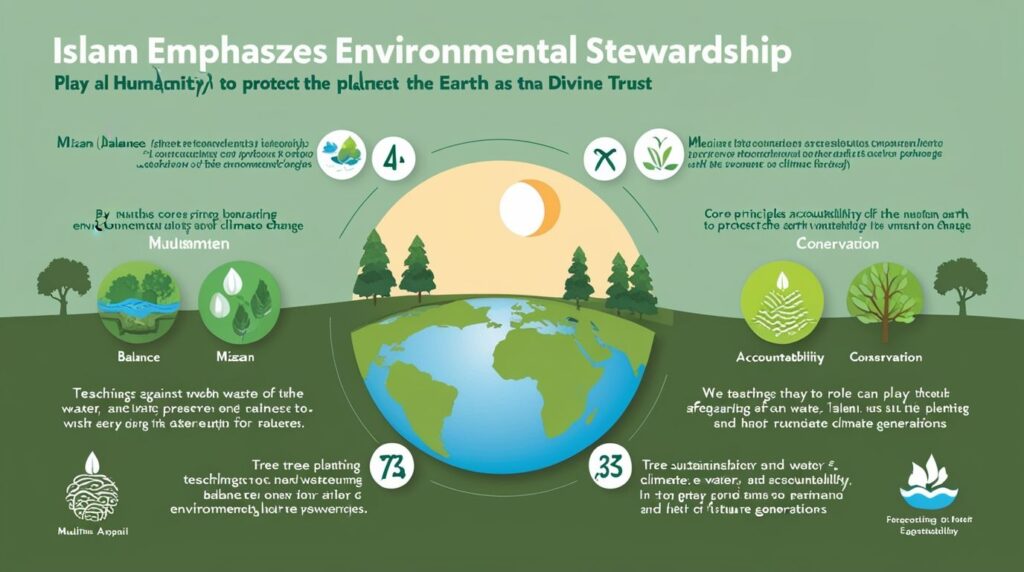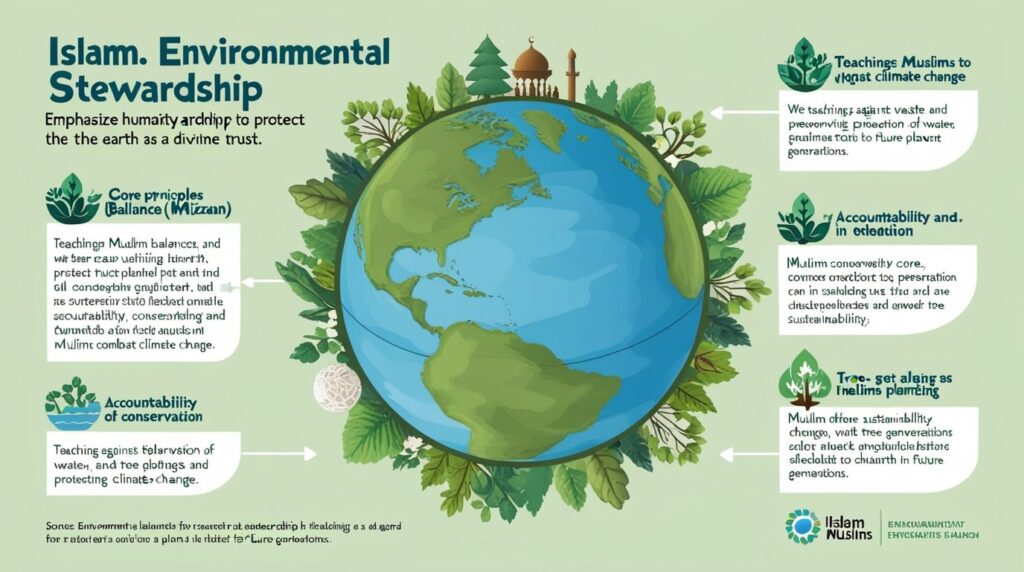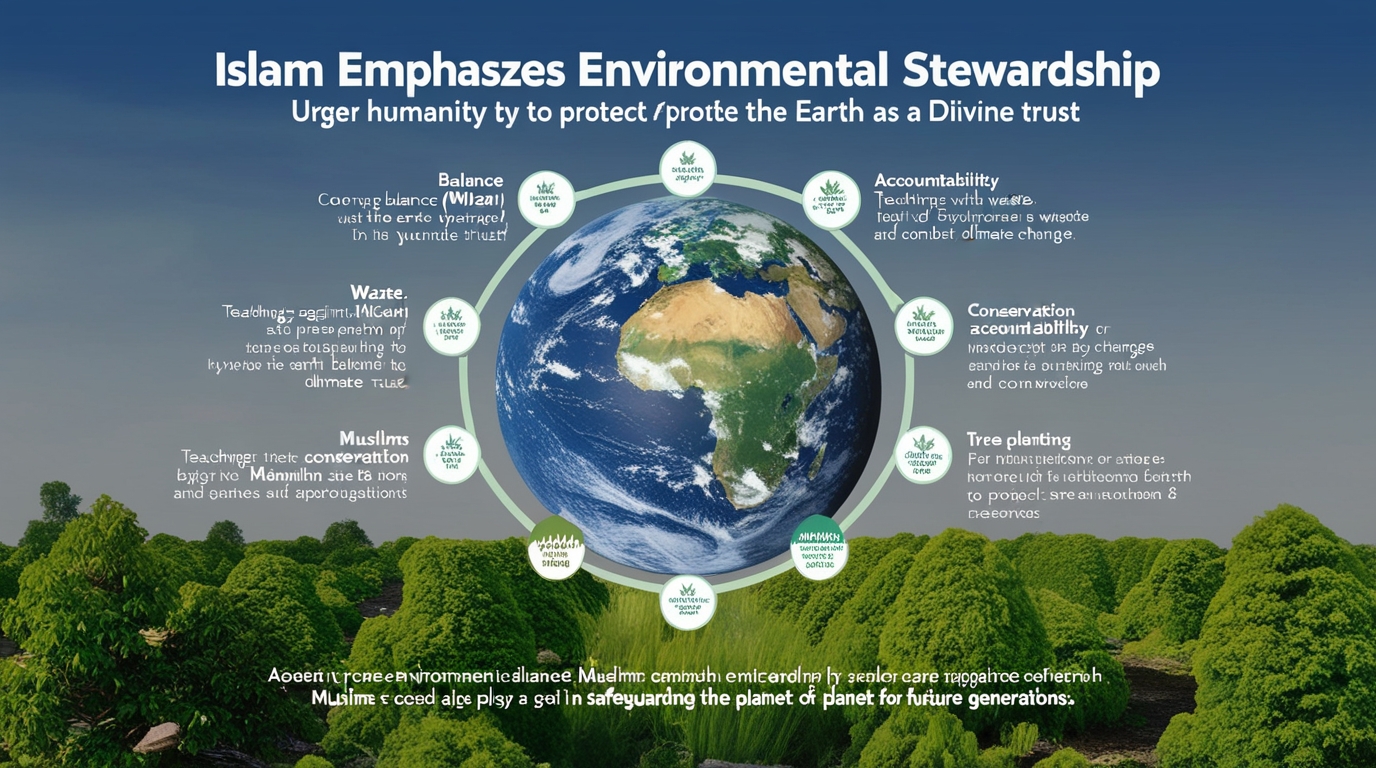Islam and Climate Change, Climate change is one of the most pressing global challenges, demanding a unified response from all segments of society. Islam, as a comprehensive way of life, offers profound guidance on environmental stewardship. Rooted in the Qur’an and the teachings of Prophet Muhammad (PBUH), Islamic principles emphasize the interconnectedness of humanity with nature and the moral responsibility to protect the environment. This essay explores the Islamic perspective on climate change, the principles of environmental stewardship, and the role of Muslims in addressing this critical issue.
Islamic Principles on Environmental Stewardship
The Qur’an and Hadith highlight humanity’s responsibility to care for the Earth. Allah entrusted humans as stewards (“khalifah”) of the planet, making them accountable for its well-being. Key principles in Islam concerning the environment include:
1. Tawhid (Oneness of Allah)
Tawhid underscores the unity of creation under Allah’s sovereignty. The Qur’an reminds believers that everything in the heavens and earth belongs to Allah:
“To Allah belongs whatever is in the heavens and whatever is in the earth…” (Qur’an 2:284).
This interconnectedness implies that harming the environment disrupts the divine balance (“mizan”) established by Allah.
2. Khalifah (Stewardship)
Humans are designated as stewards of the Earth, tasked with its care and preservation. The Qur’an states:
“It is He who has made you successors upon the earth…” (Qur’an 35:39).
This stewardship requires sustainable use of resources and the prevention of environmental degradation.
3. Mizan (Balance)
Islam emphasizes maintaining the balance of nature. The Qur’an declares:
“And the heaven He raised and imposed the balance, that you not transgress within the balance…” (Qur’an 55:7-8).
This balance highlights the importance of sustainable living and respecting ecological limits.
4. Amanah (Trust)
The Earth and its resources are a trust (“amanah”) given to humanity by Allah. Muslims are obligated to use these resources responsibly, ensuring they benefit all creatures without causing harm.
5. Accountability (Hisab)
Islam teaches that humans will be held accountable for their actions, including their treatment of the environment. Prophet Muhammad (PBUH) said:
“The world is sweet and green, and verily Allah is going to make you generations succeeding one another, so that He may see how you act…” (Sahih Muslim).

Islamic Teachings Relevant to Climate Action
Islam and Climate Change, Islam’s holistic approach provides practical guidelines for addressing climate change and environmental issues:
1. Prohibition of Waste
Wastefulness is strongly condemned in Islam. The Qur’an advises:
“Indeed, the wasteful are brothers of the devils…” (Qur’an 17:27).
Muslims are encouraged to adopt sustainable practices, minimize waste, and conserve resources.
2. Preservation of Water
Water, a vital resource, is considered a blessing in Islam. Prophet Muhammad (PBUH) emphasized water conservation, even during ablution:
“Do not waste water, even if performing ablution on the banks of a flowing river.” (Ibn Majah).
This teaching underscores the importance of water management in combating climate change.
3. Tree Planting and Afforestation
Islam encourages tree planting and greening the Earth. Prophet Muhammad (PBUH) said:
“If a Muslim plants a tree or sows seeds, and then a bird, or a person, or an animal eats from it, it is regarded as a charity.” (Sahih Bukhari).
This guidance aligns with modern reforestation efforts to combat deforestation and mitigate climate change.
4. Protection of Wildlife
Islam advocates for the protection of animals and biodiversity. Prophet Muhammad (PBUH) forbade harming animals and emphasized their rights. This principle supports efforts to maintain ecological diversity and prevent habitat destruction.

Muslim Contributions to Climate Action
Muslims worldwide are increasingly recognizing their religious duty to address climate change. Key contributions include:
1. Advocacy and Awareness
Islamic scholars and organizations are raising awareness about the environmental crisis, emphasizing Islamic teachings on sustainability. Initiatives like the Islamic Declaration on Climate Change (2015) call upon Muslims to take decisive action to protect the planet.
2. Green Mosques
Many mosques are adopting eco-friendly practices, such as using renewable energy, conserving water, and promoting environmental education. Green mosques serve as models for sustainable living within communities.
3. Community Projects
Muslim communities are involved in tree planting, waste management, and clean energy projects, demonstrating practical applications of Islamic principles.
4. Collaboration with Global Efforts
Muslim-majority countries are participating in international climate agreements and initiatives, contributing to global goals for reducing carbon emissions and enhancing resilience to climate impacts.
Challenges and Opportunities
While Islam provides a strong ethical foundation for environmental action, challenges remain:
- Cultural Practices: In some communities, cultural habits overshadow Islamic teachings, leading to unsustainable practices.
- Economic Pressures: Developing nations face economic constraints that hinder investment in green technologies.
- Lack of Awareness: Many Muslims are unaware of Islam’s environmental teachings, limiting their active participation in climate action.
However, these challenges also present opportunities for education, policy reforms, and collaboration between religious and secular organizations.
Conclusion
Islam and Climate Change, Islam’s principles of stewardship, balance, and accountability provide a robust framework for addressing climate change. By aligning modern environmental strategies with Islamic teachings, Muslims can play a pivotal role in combating this global crisis. Embracing sustainable practices, raising awareness, and fostering collective action can help build a greener and more just world, fulfilling humanity’s trust as stewards of Allah’s creation.

10 thoughts on “Islam and Climate Change”
Comments are closed.